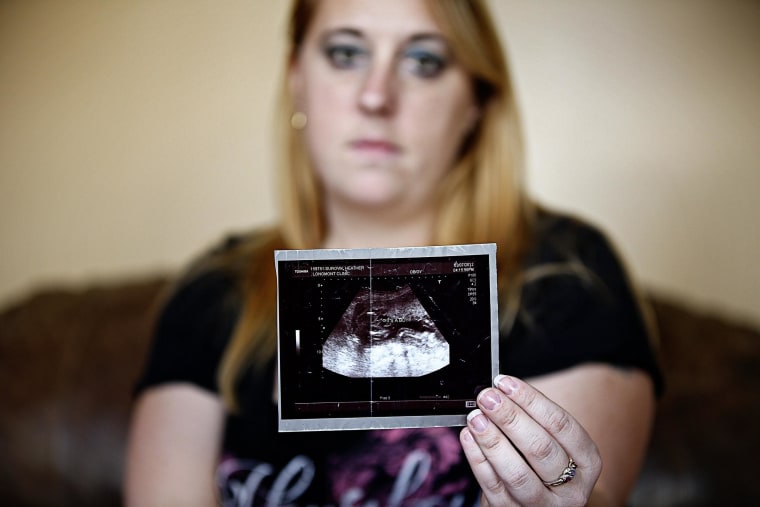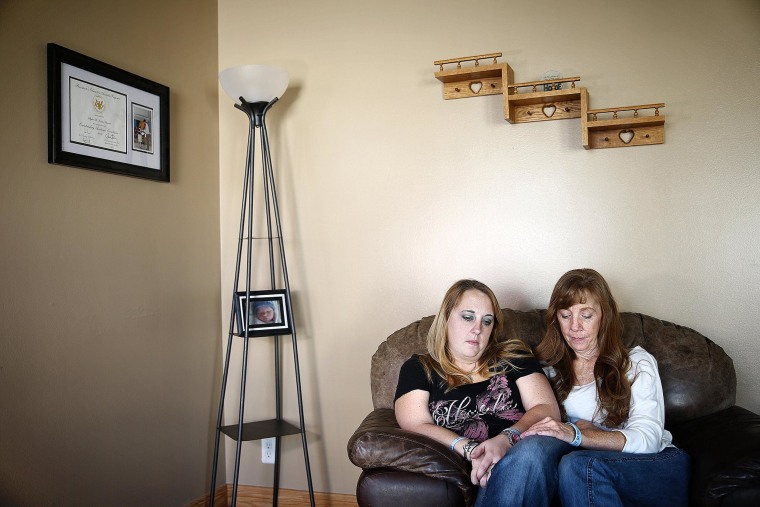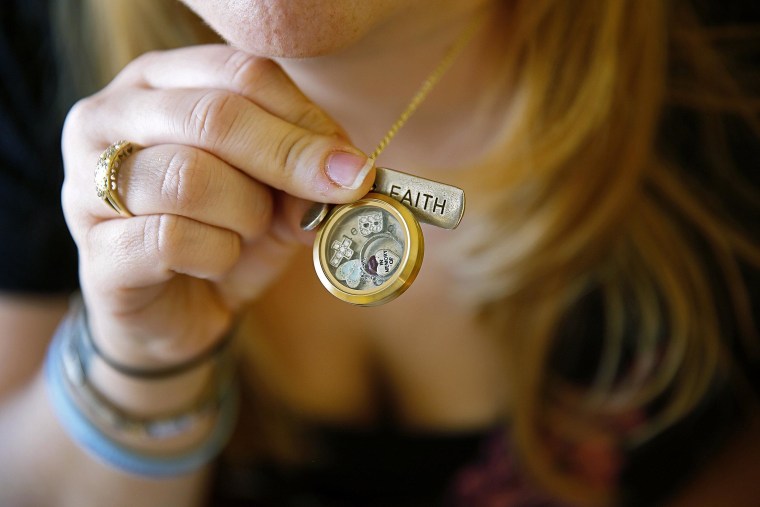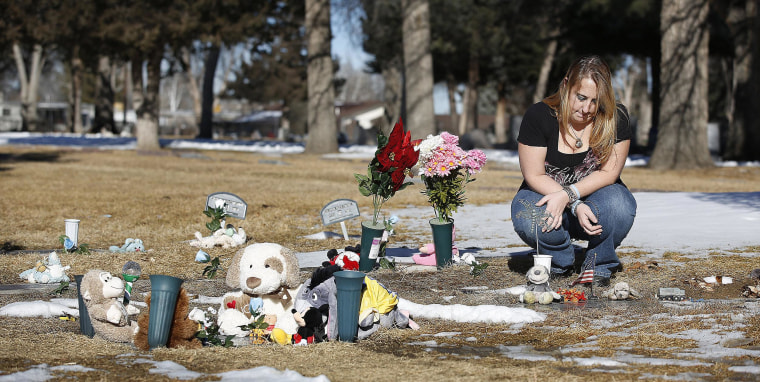Heather Surovik was eight months pregnant when a drunk driver smacked into her car on a summer afternoon on the outskirts of Denver. A 27-year-old preschool teacher at the time, she was expecting to give birth within days, in July 2012, to a boy she called Brady. "I survived," she said. "Brady did not." To Surovik, that was a homicide. But not according to Colorado law. "I was told that because my son did not take a breath, he was not considered a person," she said. "He was considered part of my injuries—a loss of a pregnancy." In her case, a repeat drunk driver named Gary Sheats pleaded guilty to driving under the influence and vehicular assault. "Those charges didn't matter to me because they didn't involve my son," Surovik said. "I wanted to figure out a way to get justice."

Her experience is at the heart of a heated debate that will bring Colorado voters to the polls this November to decide on a measure known as the Brady Amendment, which would change the criminal code to redefine "person" and "child" to include "unborn children." The measure made the state ballot after activists collected enough signatures to put it there. Also called Amendment 67, the measure is backed by "personhood" proponents, who believe life begins when egg meets sperm. These activists are busy pushing for laws around the country that would define human embryos as full-fledged people with legal rights, thereby banning abortion. Personhood measures have made the state ballot twice before in Colorado, led by the efforts of a Denver-based nonprofit called Personhood USA, but did not pass. Surovik says that for her, this law is personal. "There were two victims here," she said. "My son wasn't a loss of a pregnancy—he was a person, an eight-pound boy." She said the law is a bid for justice for "both the mother and unborn child."
"It was hard to see a picture of him—that's all I had of him. But also, he was perfect. I have those pictures on my walls now."
Opponents argue the opposite—that the law would work against pregnant women. "This measure would make every pregnant woman the potential perpetrator of a violent crime—whether she has an abortion, experiences a pregnancy loss, or goes to term having done anything including smoking a cigarette that someone views as creating a risk to the fertilized egg, embryo or fetus," said Lynn Paltrow, executive director of the nonprofit National Advocates for Pregnant Women. Thirty-eight states have laws regarding fetuses killed by violent acts against pregnant women, according to the National Conference of State Legislatures. Some of the laws focus on harm done to a pregnant woman and the loss of her pregnancy, while most of the laws, known as fetal-homicide, or feticide, laws, define the fetus as a person and a potential crime victim in its own right. The Brady Amendment goes beyond typical feticide laws, according to Paltrow: Feticide laws, she said, amend only a limited number of criminal laws such as murder and assault laws, not the entire criminal code. Surovik said she had never thought about personhood or feticide laws until her ordeal. The day of the crash was "the worst day of my life," she said. A divorced mother of two young children at the time, she was driving home from a doctor checkup, the last scheduled appointment before she was due to give birth, she said. Her mother and her 5-year-old son were in the car with her. The drunk driver drove through an intersection, Surovik said, and hit the passenger side of the car, where her mother sat. "I remember thinking I must be in heaven," Surovik said, recalling the sudden burst of the airbag. "Everything was so cloudy." She was rushed to the hospital with sharp pain in her back. "I had never felt pain like that before," she said. "That was not a fun pain." She woke up later from emergency surgery and learned the news: "My mom and dad were in the room, and my sister, too. They said Brady was gone," she said. "All I could do was cry. No one prepares you for that. Your mother doesn't sit you down and say, 'Here's what to do if you lose a baby.'" Surovik said her family saw Brady and photographed him for her, as she didn't feel ready to see him at the time. "I wanted to remember him as active—the hiccups, everything," she said.

Afterward Surovik and her mother moved in together to help each other recuperate from head injuries, she said, noting that her mother still suffers from short-term memory loss. "I just took it one day at a time. I still do," Surovik said. "I know now how fast your life can change." She planned a funeral for Brady, she said, and when she felt ready, she looked at the pictures her family had taken. "I had mixed emotions about seeing the photos," she said. "It was hard to see a picture of him—that's all I had of him. But also, he was perfect. I have those pictures on my walls now. I look at them every day. That's what keeps me going." (The drunk driver, Sheats, committed suicide before serving any time.)
Opponents of personhood argue that the measures could have wide-ranging effects on women's reproductive rights, extending beyond abortion.
Surovik took her case to state lawmakers, pushing for a fetal-homicide law. She testified at a hearing and a bill was proposed in early 2013, but it did not pass. During the course of her campaign, Surovik met some activists from Personhood USA; she decided to work with them, she said, because "they know how to get things done, how to push for amendments." In Colorado, personhood amendments made the ballot in 2008 and 2010 after activists collected enough signatures to qualify. Nine states reportedly introduced personhood bills and ballot initiatives last year; no state has passed a personhood amendment. This November in North Dakota, voters will decide on a personhood amendment referred by the state legislature, determining whether the state constitution should assert that life begins at fertilization. Opponents of personhood, including Planned Parenthood and the Center for Reproductive Rights, argue that the measures could have wide-ranging effects on women's reproductive rights, extending beyond abortion. For instance, if an embryo is considered a person, any contraceptives that prevent an embryo from implanting in the womb could be considered illegal. (The FDA says the morning-after pill and the copper IUD may prevent implantation, although the science behind the morning-after pill is hotly contested.) Opponents also say personhood could jeopardize in-vitro fertilization, as unused embryos are often discarded during the process. "Opponents have long used scare tactics like these," said Jennifer Mason, communications director of Personhood USA. "Recognizing that there are two victims in cases like Heather's cannot ban in-vitro fertilization, nor can it ban contraception. Recognizing that Brady is a person is a threat the abortion industry, who profits from the idea that babies like Brady are not people. Brady was a person when he was newly conceived, when he was at eight weeks gestation, 18 weeks gestation and eight months gestation. Brady was fully human, fully alive, and Colorado law should have ensured justice for Heather and Brady." Paltrow disputed the claims on scare tactics, citing a recent study she coauthored in the Journal of Health Politics, Policy, and Law that illustrated the problems women can face when a fetus is considered a legal person separate from the mother. She said there were more than 400 cases between 1973 and 2005 involving "arrests and forced interventions" on women in which "pregnancy was a necessary element." She cites a recent Indiana case as an example. In that case, a woman named Bei Bei Shuai tried to commit suicide while pregnant. She survived but the fetus did not, and she was charged with murder. (She has since agreed to a plea deal with a lesser charge.)

Surovik said her goal is to give her son a voice. She worked with personhood advocates on the Brady Amendment, then started collecting signatures along with her mother—speaking at churches and county fairs—to put the measure on the state ballot. "I would hold up a sign saying my son Brady was killed by a drunk driver before he was born," Surovik said. "A lot of people stopped and listened." They collected some 140,000 signatures, around 50,000 more than were needed. In the meantime, Colorado passed a law in the spring of 2013 called the Crimes Against Pregnant Women Act, which establishes a new set of crimes against pregnant women, including "unlawful termination of pregnancy" and "vehicular unlawful termination of pregnancy." The legislation specifies that it does not "confer personhood, or any rights associated with that status, on a human being at any time prior to live birth." In addition, the law notes that "nothing in this act shall be construed to permit the imposition of criminal penalties against a woman for actions she takes that result in the termination of her pregnancy."
"If Brady had been in the accident at just one hour old, it would have been murder."
Surovik said the law doesn't go far enough. "It doesn't recognize the two victims," she said. "People call it a fetal-homicide law, but it's not. It doesn't protect the baby." Vicki Cowart, president of Planned Parenthood of the Rocky Mountains, said her group worked closely with legislators "on both sides of the aisle" on the law. "Planned Parenthood wanted to help solve the problem," she said. "We agreed that when something like this happens, there should be penalties," she said, referring to Surovik's loss. "The law strikes a careful balance—it penalizes the crime and also recognizes women's reproductive freedom. The act very specifically does not establish fetal personhood," she said. "All women need to have the right to decide for themselves when life begins. Personhood would take that right away." Mason said she thinks the Brady Amendment will pass, citing the success of the signature-collecting campaign. "If Brady had been in the accident at just one hour old, it would have been murder," she said. "This law makes sure pregnant victims of violent crimes will have justice for themselves and their unborn babies." Cowart said opponents are ready to fight. "We're going to do everything in our power to make sure people understand what's behind this law. It is a personhood law. It will be used to ban abortion," she said. "But Colorado has a deep history of standing up and letting women make their own choices." Surovik said she is ready to fight, too. "If I just sat back and said, 'Poor me,' then other babies still would not be getting justice," she said. "I think sharing my personal story helps people to open their eyes."
